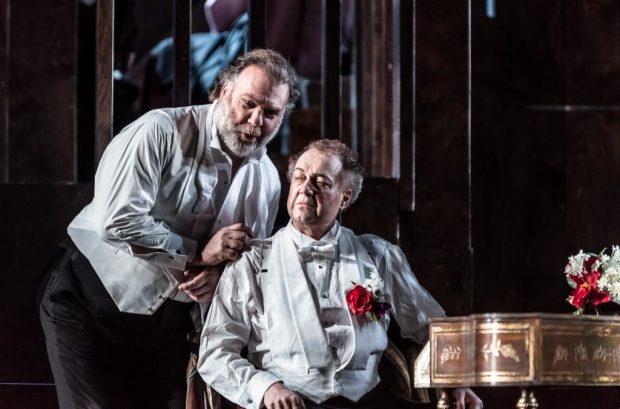Review: Die Meistersinger von Nürnberg (Royal Opera House)

© Clive Barda
Well, he’s gone. The short-lived love affair is over and Kasper Holten is already back in Denmark, ready to hatch the next stage of a career that’s been too peripatetic for his own good – and for ours. Still, the Royal Opera‘s erstwhile director of opera has not departed without a farewell salute. But it's less twelve-gun than two-fingered.
As one of Europe’s busiest directors, Holten might have been expected to shoulder his share of new work under the terms of his remuneration, but instead he’s chased after lucrative jobs elsewhere and in six years he has a mere four ROH productions to his name. Worse, only two of those were up to much: the less-than-crowd-drawing Król Roger and L’Ormindo. So hopes were high that with Die Meistersinger von Nürnberg he might at least leave something worth reviving.
Dream on. This banal staging of Wagner’s tale of medieval German guilds and their songsters is set in the hallowed portals of a gentlemen’s club (as was ENO's short-lived Rigoletto. See? Nothing is new) and it screams resentment against institutionalised Britain. From the infantile behaviour of superannuated schoolboys to a final flourish which requires the opera’s most sympathetic character—aka Holten himself, presumably—to run in disgust from the perpetuation of the old school tie, it is indulgent beyond belief.
Where does this leave the music? In the safe hands of Antonio Pappano, happily, and it soars. Indeed, I’ve rarely experienced such a disjunct between what we see and hear on an operatic stage. Pappano is sometimes criticised for his Wagner, for attending more to polished phrasing than to musical architecture, but there was no sign of that in a reading that favoured fast tempos (possibly to help counter the lumbering visuals) and radiant expression. He seemed to bend time: five and a half hours flashed by, yet hung suspended at moments like the chord that announces Walther’s song. The ROH Orchestra and Chorus responded like angels.
'Directed to act like a bolshy greaseball'
Not all the singers were on that kind of form, with Bryn Terfel‘s Hans Sachs seeming disinterested and vocally bloodless during the first two acts. By Act Three, happily, he was his old self. Rachel Willis-Sørensen sang Eva with an unattractive wispiness that distorted the ineffable third-act quintet, while Gwyn Hughes Jones, an excellent Walther for ENO recently, had been directed to act like a bolshy greaseball. That suited his character’s frustration but left no room for lyrical ardour.
For the real deal, there were two welcome veterans of the Gyndebourne Meistersinger plus one novice. The latter, tenor Allan Clayton, was, unsurprisingly, the ideal David: eager, fresh-toned and constantly engaged in his performance. Hanna Hipp (Magdalene) and Johannes Martin Kränzle (Sixtus Beckmesser), for their part, kept a firm grip on the opera that Wagner actually wrote. The German baritone’s touchingly hapless Beckmesser transcended the production with some fine singing (where Wagner allows) and expert buffoonery in Act 2 as Terfel’s Sachs hammered his shoe not outside his workshop but, weirdly, while still seated for dinner at his club.
However outlandish a production, provided it has an inner logic it will work. So what to make of the messed-up nightmare that replaces Wagner’s riot at the end of Act 2? It’s meaningless. Mia Stensgaard‘s ugly, costly, hi-tech set holds surprises of a sort, but no one is likely to gasp at her interlocking spurs and double revolves when their use militates so fiercely against Wagner’s intentions. Dark institutional brown is the colour of choice and it fairly reflected my mood on exit. A crushing disappointment.
Die Meistersinger von Nürnberg continues in repertory at the Royal Opera House until 31 March.










